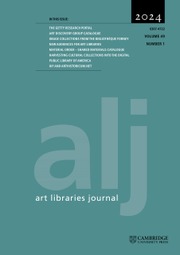Article contents
Towards an activist research: Is Wikipedia the problem or the solution?
Published online by Cambridge University Press: 02 November 2020
Abstract
Is the internet a tool for democracy or the manifestation of the global digital divide? Using the colonization of the internet as a starting point, this article outlines some current issues with knowledge equity, asking if democratic open access products like Wikipedia are the solution or another manifestation of the systemic bias of society. Whilst acknowledging librarianship has its own colonial legacies to address, the suggestion is made that critical librarianship can provide a response in the form of library–based edit-a-thons and Wikipedia workshops. These show how the power of Wikipedia can be used responsibly not just for enabling critical information literacy, but as an instrument for activism. In considering librarian interventions done so far at the University of the Arts, London, the article outlines future practical possibilities for decolonization, as well as looking more widely at how to democratize information in open access products and the Western publishing that sits behind them.
- Type
- Research Article
- Information
- Copyright
- Copyright © The Author(s), 2020. Published by Cambridge University Press on behalf of ARLIS
References
1. Internet World Stats. “Internet Usage Statistics.” Accessed May 8, 2020. https://www.internetworldstats.com/stats.htm.
2. Graham, Mark, Sabbata, Stefano De and Zook., Matthew “Towards a study of information geographies:(im)mutable augmentations and a mapping of the geographies of information.” Geo: Geography and Environment 2, no. 1 (2015): 88–105, 90Google Scholar.
3. Whose Knowledge. “De-colonizing the Internet.” Accessed March 8, 2020. https://whoseknowledge.org/initiatives/decolonizing-the-internet/.
4. Lupač., Petr Beyond the Digital Divide: Contextualizing the Information Society. Bingley: Emerald Publishing Ltd, 2018, 135CrossRefGoogle Scholar.
5. Roblimo (Robin Miller). “Wikipedia Founder Jimmy Wales Responds.” Slashdot (blog), July 28, 2004. Accessed May 8, 2020. https://slashorg/story/04/07/28/1351230/wikipedia-founder-jimmy-wales-responds.
6. Nick Routley. “Ranking the top 100 websites in the world” Visual Capitalist, August 7, 2019. Accessed May 8, 2020. https://www.visualcapitalist.com/ranking-the-top-100-websites-in-the-world/.
7. Wikipedia. “Wikipedia: size of Wikipedia.” Accessed May 8, 2020. https://en.wikipedia.org/wiki/Wikipedia:Size_of_Wikipedia.
8. Whose Knowledge. “De-colonizing the Internet.” Accessed January 11, 2020. https://whoseknowledge.org/decolonizing-the-internet-conference/.
9. Graham, De Sabbata and Zook. “Towards a study,”, 96.
10. Graham, De Sabbata and Zook, “Towards a study,” 97.
11. Art + Feminism. “Art + Feminism: About.” Accessed March 8, 2020. https://www.artandfeminism.org/.
12. Danielle Robichaud and Krista McCracken. “Doing the work: Editing Wikipedia as an act of reconciliation.” On Archivy (2018): 1–9. Accessed March 8, 2020. https://medium.com/on-archivy/doing-the-work-editing-wikipedia-d82e927adb9f
13. Peter Gallert and Maja van der Velden, “The sum of all human knowledge: Wikipedia and Indigenous knowledge,” in At the Intersection of Indigenous and Traditional Knowledge and Technology Design, ed. Nicola Bidwell, and Keike Winschiers-Theophilus (California: Informing Science Press, 2015), 119.
14. Art + Feminism. “About.” Accessed March 8, 2020. https://www.artandfeminism.org/.
15. Whose Knowledge. “#VisibleWikiWomen.” Accessed March10, 2020. https://whoseknowledge.org/initiatives/visiblewikiwomen-2020/.
16. Wikipedia. “Wikipedia: Systemic Bias.” Accessed May 8, 2020. https://en.wikipedia.org/wiki/Wikipedia:Systemic_bias.
17. Gallert and van der Velden, “The sum of all”, 119.
18. Drabinski., Emily “What is critical about critical librarianship?” Art Libraries Journal 44, no. 2 (2019): 49–57CrossRefGoogle Scholar, 51.
19. Crilly, Jess, and Montero., Gustavo Grandal “Editors’ note.” Art Libraries Journal 44, no. 2 (2019): 47–48CrossRefGoogle Scholar, 47.
20. Drabinski, “What is critical about critical librarianship?” 53.
21. Alexandra Duncan and Cassy Sachar. “Episode 03: #FightThePower.” ARLISmatters. March 18, 2018, podcast, 24:32. https://soundcloud.com/user-819912910/episode-03-fightthepower.
22. Evans., Siân “Art + Feminism: an interview with Siân Evans.” Interview by Gustavo Grandal Montero. Art Libraries Journal 44, no. 2 (2019): 72–77CrossRefGoogle Scholar, 74.
23. Haslam., Thomas “Wikipedia and the Humanities in Higher Education: Past Time to Re-negotiate the Relationship” International Journal of Information and Education Technology 7, no. 4 (2017): 246–251CrossRefGoogle Scholar, 250.
24. Haslam, “Wikipedia,” 250.
25. Evans, “Art + Feminism,” 52.
- 2
- Cited by


